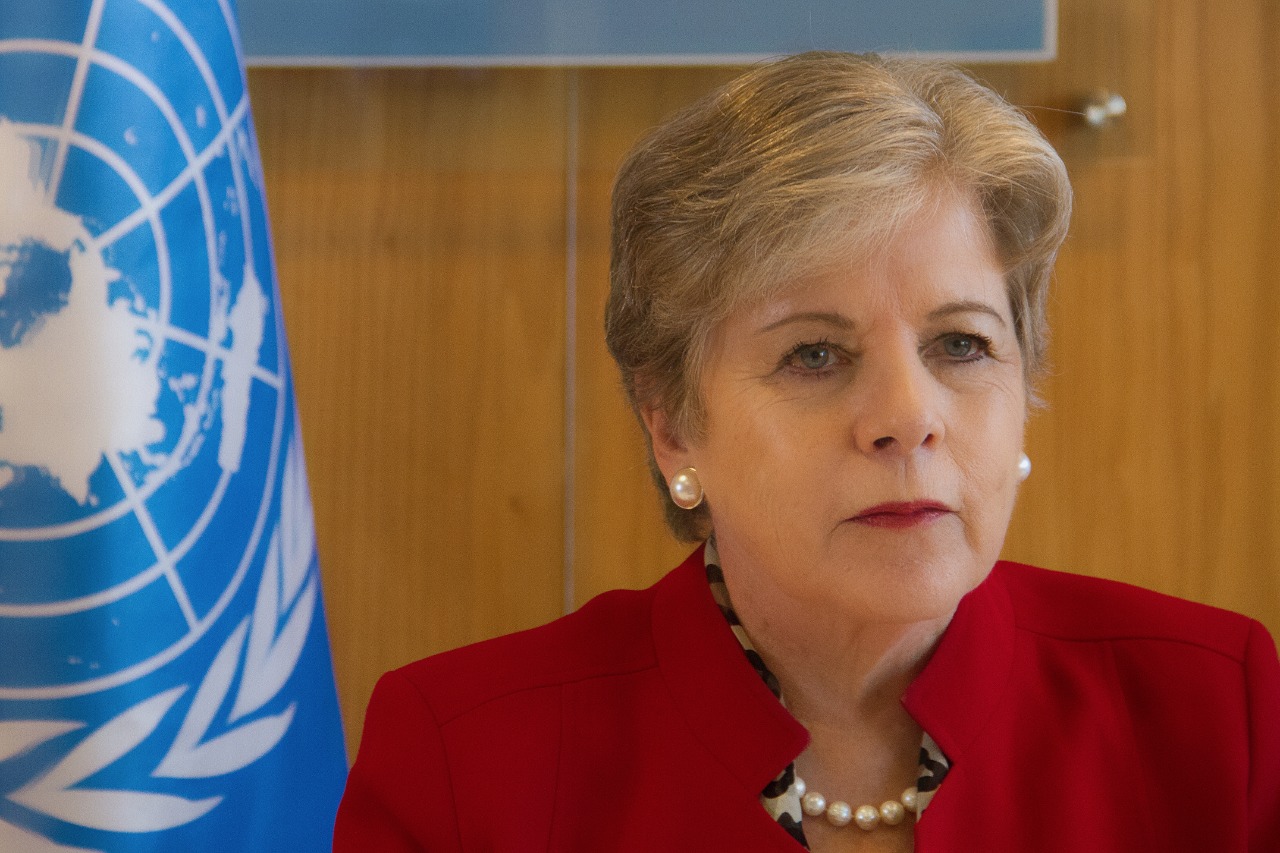Alicia Bárcena Calls for Promoting New Fiscal Strategies and Greater International Cooperation amid Growing Asymmetries to Finance a Big Push for Sustainability
Work area(s)
Speaking before Environment Ministers, ECLAC’s Executive Secretary presented a new document by the Commission on financing for sustainable development in the context of the post-COVID-19 recovery in the region.

The Executive Secretary of the Economic Commission for Latin America and the Caribbean (ECLAC), Alicia Bárcena, urged the region’s countries to promote new fiscal strategies and greater international cooperation amid growing asymmetries in order to finance a big push for sustainability, during the Forum of Ministers of Environment that is taking place today in Costa Rica.
Alicia Bárcena was the keynote speaker during a High-level Dialogue on “Accelerating Finance,” in which the other participants included Sonia Muñoz, Division Chief in the Caribbean for the International Monetary Fund (IMF); Andrew Steer, President and CEO of Bezos Foundation; Rafael Mateo, CEO of ACCIONA; Eric Usher, Director of the United Nations Environment Programme (UNEP) Finance Initiative; and Fiona Clouder, Climate Change Ambassador of the United Kingdom for Latin America and the Caribbean.
In her remarks, ECLAC’s Executive Secretary emphasized that the pandemic has magnified environmental degradation with serious setbacks to the 2030 Agenda for Sustainable Development.
She noted that while there are clear impacts from climate change today, there is less public funding for the environment and climate action. In addition, there are mounting pressures in urban areas, with public transportation underfunded and informal settlements on the rise.
ECLAC’s highest authority affirmed that the fiscal stimulus and public spending implemented by the region’s governments during the pandemic have been focused more on current expenditures, which has translated into social transfers that were clearly important for households. However, she said, the opportunity to foment transformative sectors has been lost, which accentuates the unsustainability of the pre-crisis development pattern.
“At a time when the environmental situation and global asymmetries are worsening, there are reduced budgets for sustaining the focus of declarations of the Nationally Determined Contributions (NDCs). We have carried out an analysis of environmental budgets in public spending and we can see that they fell by half between 2019 and 2020, going from 0.4% of GDP to 0.2%, despite an increase in environmental problems,” she specified.
Alicia Bárcena warned that the COVID-19 crisis exacerbated structural problems such as low investment and increased debt levels, especially in the Caribbean, and she emphasized that investment and productivity are a structural problem in Latin America that constrains the possibility of sustaining a recovery beyond the rebound in GDP in 2021. Investment in the region represented 19.5% of GDP in 2021, versus 26.8% in the world, she noted.
In addition, Alicia Bárcena explained, the region is forging further along an unsustainable investment path by reinforcing the pre-existing pattern of consumption. Total spending in 2021 amounted to $421 billion dollars, with green investment representing just 1% of all announced expenditures.
“It is necessary to promote strategic investment in green sectors, such as the decarbonization of the electricity matrix, electromobility, the bioeconomy and nature-based solutions, and the circular economy,” she stressed.
The senior official affirmed that, in order to expand fiscal space and finance and guide sustainable development, it is necessary to eliminate tax evasion and tax expenditures (tax noncompliance represents $325 billion dollars, or 6.1% of regional GDP, while tax expenditures account for 3% of regional GDP); to review and progressively update royalties on the exploitation of non-renewable resources; to reduce subsidies for fossil fuels; and to improve the paltry revenue collected via the carbon tax, which is set at around just $5 dollars per tonne and only in 4 countries, and which could help expand fiscal space significantly if it were to be increased gradually to $40 per tonne.
Finally, ECLAC’s Executive Secretary called on countries to realign public policies to achieve an additional point of transformative investment annually through a set of funding sources, and she underlined that international cooperation on financing for development for greater sustainability and climate resilience is extremely important.
“We must expand and redistribute liquidity, strengthen development banks, promote innovative instruments and integrate debt reduction with resilience,” she concluded.
In the context of her participation in this forum, the senior United Nations official presented a document entitled How to finance sustainable development: Recovery from the effects of COVID-19 in Latin America and the Caribbean, which is the thirteenth special report in a series prepared by ECLAC on the evolution and effects of the COVID-19 pandemic in the Latin America and Caribbean region.
The document warns that global asymmetries influence policies for recovery in Latin America and the Caribbean and emphasizes that nearly 30 years after the Earth Summit and the global adoption of an international development agenda, in practical terms, the environmental pillar of the 2030 Agenda for Sustainable Development has not been taken into consideration in recovery policies in the region.
It adds that the transfers to support consumption strengthen an unsustainable development pattern and recovery measures prolong the anchoring to an approach that results in high vulnerability to environmental impacts, with unchanged or increased dependence on fossil fuels.
“The region is squandering the opportunity to use the recovery effort to enhance production and consumption patterns and improve the quality and coverage of public services, which the coronavirus disease (COVID-19) pandemic has shown to be very important,” it affirms.
Related content
Cómo financiar el desarrollo sostenible: Recuperación de los efectos del COVID-19 en América Latina y el Caribe
Presentación de Alicia Bárcena, Secretaria Ejecutiva de la CEPAL.
Related link(s)
Country(ies)
- Latin America and the Caribbean
Contact
Public Information Unit
- prensa@cepal.org
- (56 2) 2210 2040